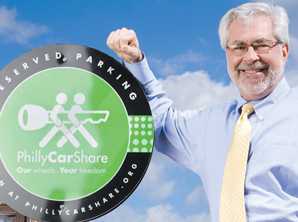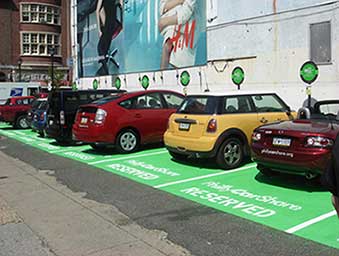Related Topics
Customs, Culture and Traditions
Abundant seafood made it easy to settle here. Agriculture takes longer.
Volunteerism
The characteristic American behavior called volunteerism got its start with Benjamin Franklin's Junto, and has been a source of comment by foreign visitors ever since. It's still a very active force.
Right Angle Club 2009
The 2009 proceedings of the Right Angle Club of Philadelphia, beginning with the farewell address of the outgoing president, John W. Nixon, and sadly concluding with memorials to two departed members, Fred Etherington and Harry Bishop.
Old Age, Re-designed
A grumpy analysis of future trends from a member of the Grumpy Generation.
Phillycarshare
 |
| Jerry Furgione |
Jerry Furgione recently intrigued the Right Angle Club with what those small red cars are all about. A non-profit organization named PhillyCarShare has been able to grow a fleet of 400 autos to rent by the hour -- gas, insurance and washing included. Each car has a home base in some parking lot or garage or other accessible place, from which you take it, and back to which it goes when you are done with it. Reservations are handled by phone or internet, payment by credit card; a platoon of attendants come around at night to refill the gas and check on things.

|
| Philly Car Share Lot |
Now that's not quite as convenient as having the car delivered, or picking it up at one place and dropping it off at another, but it's workable. One of the technical secrets is a wireless system working a lock which can be controlled remotely. For a $25 onetime membership fee the customer gets identified with a particular lock, and the car keys are inside the car. That's a little kludgey (as trendy people say) because if you forget to lock the car when it's parked it can be stolen. No doubt technology could soon be developed to handle the whole business electronically, emitting signals that the car is parked but unlocked, issuing automated scolding and just-this-once remote locking and unlocking, and perhaps a dozen other engineering features. But that requires more volume than 400 cars, and it's early days. Present reliance is made on repeated reminders to lock the car when you aren't using it, backed up with a $100 fine if you forget. It's probably the biggest source of friction.
The rise in oil prices helped the car share business a lot, and enthusiasm among young early-adopters carries things quite a way, so the business is growing. It probably won't be possible to judge the future until competition appears and business levels off, at some stable point. If some of the rough spots can be fixed with gadgetry, this hourly rental system should have a permanent place in our environment. Since it's a non-profit, it will be of interest to see what variants the for-profit sector can provide.

|
| City of Philadelphia |
At the moment, the business has the nuisance of an average 6-months delay to get each new parking spot approved by the various ownership and licensing agencies. But the developers of high-rise apartments are learning that having rental cars headquartered at the building entitles the builder to provide fewer off-street parking spaces, so revenue potential starts to appear. Companies, and in particular the City of Philadelphia have taken to using this system to reduce the size of their car fleets; universities are nibbling at the idea of shared memberships. Hard to know where this will lead.
You learn some things the hard way. The cars once had a plastic card to use for filling up at a gas station, but too many cars were broken into to steal the cards, so this had to be curtailed. If you have an accident the company's insurance takes care of you, but then there are quarrels about renewals of insurance, both theirs and yours. People who are used to jumping into their own cars, and out of them whenever and where ever they please, tend to feel a little constrained by the need to make reservations and be prompt about them (because someone else might be waiting for the car).
Which brings you to the ultimate trade-off in this system. People want to have lots of cars sitting around, so they can use spur-of-the-moment planning. The business, on the other hand, wants every car to be in constant motion, every slot in the schedule filled up. Right now the cars average eight users a day and have comparatively little waiting for reservations, only because the typical user at present does not want the car during 9-5, five days a week hours. As business increases, it should emerge just what the break-even points are between too many cars and too few. From the customers' point of view, that means, "How much are you willing to pay to have a car immediately and invariably available?" At the equilibrium point between maximum customer convenience and minimum price, we'll soon see what the public really wants and will pay for.
Meanwhile, the experimentation goes on to explore the tastes and preference of the Philadelphia public, region by region. They have a few pickup trucks if you like, and even a few Lexus's. Although the original idea was developed in Europe, Philadelphia has here the largest hourly rental business in the world, and it's galloping along briskly.
Originally published: Friday, February 20, 2009; most-recently modified: Friday, May 31, 2019
| Posted by: Margaret | Feb 14, 2010 3:56 PM |